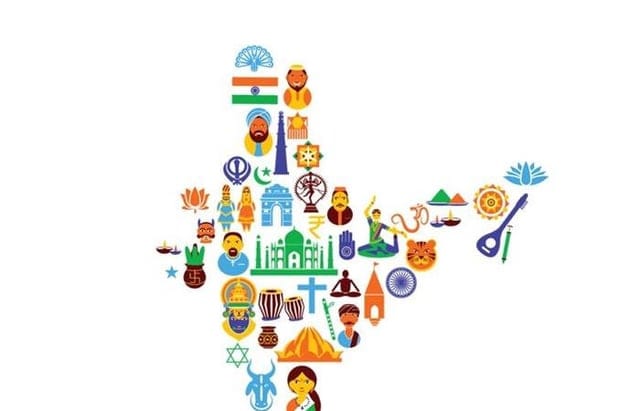– Radiance Bureau
The notion of religion plays a significant role in shaping public life by directing collective efforts towards common goals. Regardless of faith, religious values inherently contribute to public welfare. All religions share fundamental value systems, and the belief that religion is strictly personal is a narrow theological interpretation. There’s a pressing need to clearly define the boundaries of religion’s influence, distinguishing between its personal and public roles.
This presents two primary arguments. First, religion serves both private and public functions, challenging the common secular view of religion as purely personal. Second, there should be a harmonious coexistence between religion’s public and personal facets, avoiding any encroachment of one over the other within or between religions. Public expressions of religion originate from personal beliefs and inherently contribute to the public good. This contrasts with secularism, which often aims to homogenize religion, overlooking its diverse public values. Instead of standardizing religion, the focus should be on fostering a polity that embraces religious diversity, trusting that religious participation contributes positively to society’s well-being.
In India, the prevailing nationalist secular approach tends to overlook religious differences, almost considering them abnormal, despite constitutional provisions stating otherwise. Article 25 of the Indian Constitution guarantees the freedom to profess, practice, and propagate religion, subject to public order, morality, and health. However, the constitutional intent to acknowledge and accommodate these differences was overshadowed by a rush to adopt Western secular ideals. This adoption, driven by nationalist fervor, avoided addressing these differences openly. There was a fear among politicians that acknowledging religious disparities might challenge their authority post-independence. Instead of engaging with these differences, politicians embraced nationalism and secularism as convenient facades. This political maneuvering sustained the polity but at a significant cost.
The lack of awareness and education about historical and structural religious differences, particularly between Abrahamic and Oriental faiths, perpetuates suspicion and provides fertile ground for manipulation. Despite claims of a syncretic culture and composite heritage, many in the majority community lack fundamental knowledge about Islam’s core tenets. Misunderstandings often lead to harmless yet ignorant assumptions and stereotyping. Instead of addressing these gaps in understanding, secular leaders focused on superficial practices, neglecting the need for informed dialogue. When genuine differences surfaced and caused harm, interventions were minimal, replaced by a facade of secularism.
Headlines denouncing the construction of mosques or attacks on worshippers contrast sharply with political Iftar parties and Eid celebrations. The public often lacks basic knowledge about Muslim customs, leading to widespread misconceptions. The influence of this superficial secularism, propagated by the intellectual elite over decades, remains strong. Dissenting voices often find refuge in this secular space, highlighting underlying societal divisions. This intellectual dominance perpetuated a blind eye towards hate politics, conveniently dismissed as a distraction by liberal parties.
Examining the genealogy of hate reveals a troubling reality. Despite various catalysts for hate, including ignorance or inferiority complexes, secularists inadvertently played a significant role in its propagation. Admitting to hate politics would expose their failures, so secularists often dismiss it as a diversion. This dismissive attitude is disturbingly echoed by some Muslims who, despite facing discrimination, echo the same narrative. In contrast, marginalized groups like Dalits and OBCs actively address their oppression. The struggles of these groups have been acknowledged and acted upon, unlike the challenges faced by Muslims, which remain unaddressed.
In Indian politics, conflicting narratives paint a complex picture. Hindus have historically harbored skepticism, if not hostility, towards Muslims, juxtaposed against claims of Hindu magnanimity. This paradoxical dynamic persists, with both liberals and conservatives embracing narratives of Hindu benevolence. Caste oppression, while a harsh reality, fails to prevent consolidation under upper-caste right-wing agendas. The oppressed often become aggressors against Muslims, serving religious ideologies. Amidst this complexity, the establishment consolidates power, enjoying widespread support yet struggling to achieve its grandiose objectives.
The nexus of secularism and communalism perpetuates Muslim marginalization. The Congress Party’s 2024 manifesto, Nyay Patra, though revolutionary in some aspects, fails to address the root causes of secularism’s shortcomings. It sidesteps the inherent flaws in the nation-state concept and liberal democracy, focusing instead on immediate outcomes. This failure highlights a systemic issue within India’s political landscape, where structural inequalities continue to erode minority rights.
The way forward requires a comprehensive acknowledgment of Muslim oppression. Structural, historical, and intentional factors have contributed to this plight, demanding urgent attention. Only by addressing these realities can substantive changes be realized. The process must involve deradicalizing the majority while initiating constitutional and legal safeguards for minorities. This includes removing Hindu bias from the constitution, ensuring proportional representation, conducting a nationwide caste census, and commissioning an Equal Opportunities Commission. Additionally, abolishing draconian laws, providing reservation in various sectors, and acknowledging state-sponsored atrocities are critical steps toward ensuring equal citizenship rights for all.
In conclusion, addressing the root causes of religious disparity and systemic oppression demands a multifaceted approach. It necessitates a paradigm shift in how religion is perceived and integrated into public life, fostering genuine understanding and equitable treatment for all religious communities.




